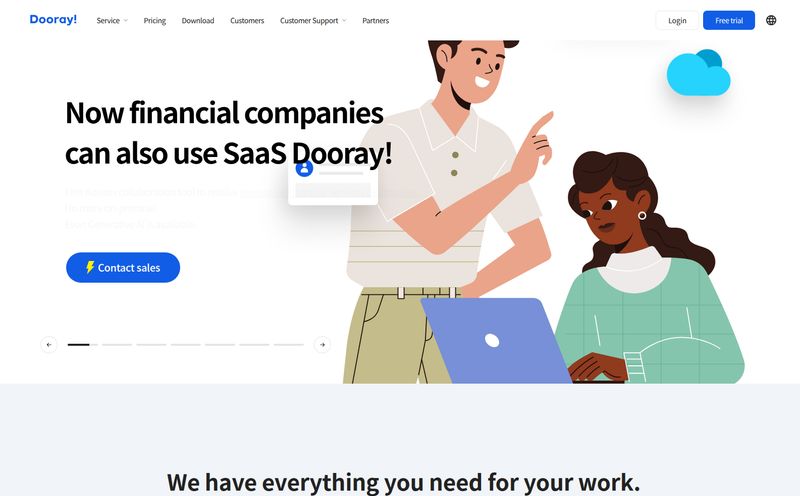If I have to sit through one more 8-hour, slide-deck-driven corporate training session, I might just lose it. You know the ones I'm talking about. The room is always too cold, the coffee is lukewarm, and by hour three, you're mentally calculating how many ceiling tiles are in the room instead of absorbing information about Q3 synergy strategies.
For years, Learning & Development (L&D) has felt like a necessary evil. We all know training is important, but the execution has often been… well, soul-crushing. That's why my ears perk up whenever I hear about a platform that claims to be doing things differently. A while back, the term 'nanolearning' started buzzing around the industry, and with it, a few platforms popped up. One that caught my eye was edu720.
They talk a big game about revolutionizing workforce education with AI and science-backed solutions. But as someone who’s seen more than a few 'game-changing' platforms fizzle out, I was skeptical. So, I did what I do best: I dug in. What is this tool really about? And is it worth the hype?
So, What Exactly is edu720 Anyway?
At its core, edu720 isn't just another Learning Management System (LMS). I feel like we have enough of those. Instead, it positions itself as a complete “workforce education” platform. The main difference? It’s built entirely around the concept of nanolearning.
Think of it less like a digital library of dusty PDFs and more like a dynamic, interactive feed of information designed for the modern brain. The platform uses a mix of interactive videos, quick-fire quizzes, and mobile-first content to teach everything from company onboarding to critical compliance topics like GDPR and AI ethics. Their website mentions a “360° approach,” which sounds like marketing fluff at first, but it seems to boil down to a simple loop: engage employees with bite-sized content, test their knowledge immediately, and use analytics to ensure they actually retained it. It’s a closed-loop system, which is way more than most traditional training programs can claim.

Visit edu720
The Nanolearning Revolution is Here to Stay
Let's face it, our attention spans aren't what they used to be. I blame TikTok, but that's a rant for another day. The reality is, we consume information in short, sharp bursts. We scroll, we tap, we watch 15-second videos. Why should workplace learning be any different?
This is where nanolearning comes in. It’s about breaking down complex topics into tiny, digestible, and engaging pieces. A 5-minute interactive video on phishing threats instead of a 60-page PDF. A quick quiz on the company’s mission statement during a coffee break. It’s learning that fits into the cracks of our busy days, and that's precisely what edu720 is built for. The testimonial on their site says, "It's innovative, very easy to use and most importantly, keeps our employees engaged, and I simple love it!" That typo feels real, and honestly, the sentiment is what every L&D manager dreams of hearing.
A Closer Look at the Key Features
A platform is only as good as its features, right? Here’s what stood out to me from the edu720 toolkit.
AI-Powered Content Feels Like the Future
Okay, “AI-powered” is the new “organic” – a term thrown around so much it’s starting to lose its meaning. But in edu720’s case, it seems practical. The platform uses AI to help personalize the learning experience and even assist in creating content. For an overworked HR or L&D department, that’s huge. It means the system can adapt to individual learning paces and knowledge gaps, and you're not stuck creating every single piece of content from scratch. This is a big step up from the one-size-fits-all approach.
Learning That Fits in Your Pocket
This is a non-negotiable for me. If your training platform isn’t mobile-friendly in 2024, you're already obsolete. edu720 is designed to be mobile-first, meaning employees can complete training on their commute, while waiting for a meeting, or basically anywhere. This accessibility is critical for companies with remote teams, field staff, or just a modern workforce that isn't chained to a desk. It respects the employee's time and workflow, which in itself can boost engagement.
Analytics That Actually Tell You Something
For years, training analytics meant one thing: completion rates. A checkmark that says, “Yes, Bob completed his annual security training.” Did Bob retain any of it? Who knows! He probably clicked through it while watching football.
edu720 seems to go deeper. The platform provides analytics on knowledge absorption, identifies common areas where employees are struggling, and tracks progress over time. This data is gold. It helps managers offer targeted support and gives the company a real pulse on its collective knowledge base. We’re talking about moving from “training as a chore” to “training as a strategic asset.”
Who Is This Really For?
After looking through its features and approach, I don't think edu720 is for every single company. If you're a small team of five people who learn by osmosis sitting next to each other, you probably don't need this. But for a few key groups, it could be a perfect fit:
- Fast-Growing Companies: When you're onboarding dozens of new hires a month, a clunky, manual process will kill your momentum. A platform like edu720 can automate and streamline that onboarding, ensuring everyone gets a consistent, engaging introduction to the company.
- Companies with High Compliance Needs: If you're in finance, healthcare, or tech, you're swimming in a sea of regulations like GDPR, HIPAA, and a growing list of AI ethics guidelines. edu720's pre-built modules for cybersecurity and privacy are a massive time-saver and a great way to ensure that crucial knowledge is actually sticking.
- Organizations with Distributed Teams: For remote or hybrid companies, creating a unified learning culture is tough. A mobile-first, nanolearning platform ensures everyone has equal access to the same high-quality training, no matter their location.
With over 60,000 users and 75 companies on board, they've clearly found their niche and are delivering real value.
The Not-So-Hidden Costs and Considerations
No platform is perfect, and it's my job to be a bit of a cynic. So, what's the catch?
First, the price. When I tried to check their pricing page... I hit a 404 error. Whoops. While that’s probably a temporary site glitch, it points to a common B2B SaaS model: you have to book a demo to get a quote. This isn't necessarily a bad thing—it usually means pricing is tailored to your company size and needs—but don't expect a simple, off-the-shelf price tag. There will be some cost involved for full access.
Second, a tool is only a tool. The effectiveness of edu720 rests heavily on employee engagement. If your company culture doesn't genuinely value continuous learning, even the most engaging nanolearnings might get ignored. You can lead a horse to water, and all that.
Finally, while the AI helps with content, it’s not a set-it-and-forget-it machine. To keep training relevant, someone still needs to drive the content strategy. This platform won't replace your L&D team; it’ll just give them a much more powerful engine to work with.
My Final Take as an SEO and Content Guy
In my world, content is king. But the format of that content is just as important. We've seen a massive shift in SEO from just long-form articles to a mix of video, web stories, and short-form content. Why? Because that's how people consume information now.
edu720 is simply applying that same logic to the corporate world. Traditional e-learning is like a dense, 5,000-word textbook. It's thorough, but a slog to get through. edu720 is more like Duolingo or a daily news podcast—it gives you a little bit each day, makes it interactive, and before you know it, you've built a habit and actually learned something. At the end of the day, that's what matters.
I think this approach is the future of workforce education. It’s smarter, more efficient, and frankly, more respectful of employees' time and intelligence. It's definitely a platform I'll be keeping an eye on.
Frequently Asked Questions About edu720
- What is nanolearning?
- Nanolearning is an educational strategy that breaks down information into very small, highly-focused chunks. These lessons are typically interactive, 2-5 minutes long, and designed to be completed on any device, making them easy to fit into a busy workday.
- Is edu720 suitable for small businesses?
- It seems best suited for mid-sized to large companies, especially those that are growing quickly or have significant compliance and onboarding needs. However, their demo-based pricing might offer plans for smaller teams, so it's worth inquiring.
- How does the AI in edu720 work?
- The AI helps personalize the learning path for each employee based on their performance on quizzes and tests. It can also assist L&D teams in generating and structuring new learning content, saving them time and effort.
- What kind of compliance training does edu720 offer?
- edu720 provides pre-built learning modules for key compliance areas, including Cybersecurity, data privacy (like GDPR), and AI Ethics, among others. These are crucial topics for many modern businesses.
- How much does edu720 cost?
- The official pricing isn't publicly listed on their website. To get a quote, you need to contact their sales team and book a demo. This typically means the pricing is customized based on your number of users and required features.
- Can I create my own content on the platform?
- Yes. While it offers pre-built modules, a key feature of edu720 is the ability for companies to create their own custom nanolearning content, tailored specifically to their internal processes, culture, and training needs.
Wrapping It Up
Look, the corporate training space is ripe for a shake-up. For too long, it's been the butt of office jokes. Platforms like edu720 are a sign that things are finally changing. By embracing technology like AI and a learning format that mirrors how we actually live and learn today, they're not just making training more bearable—they're making it more effective. And in a world where knowledge is your biggest competitive advantage, that's a pretty big deal.



